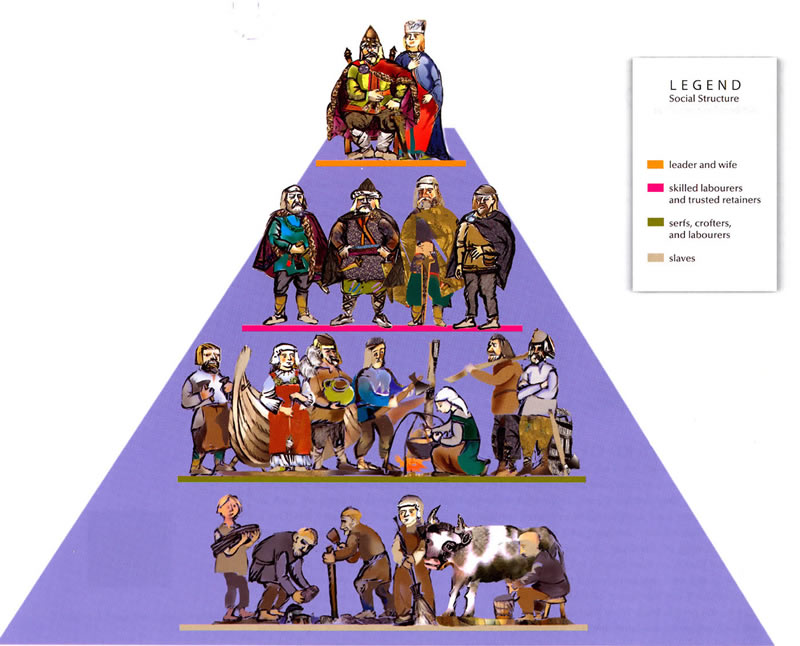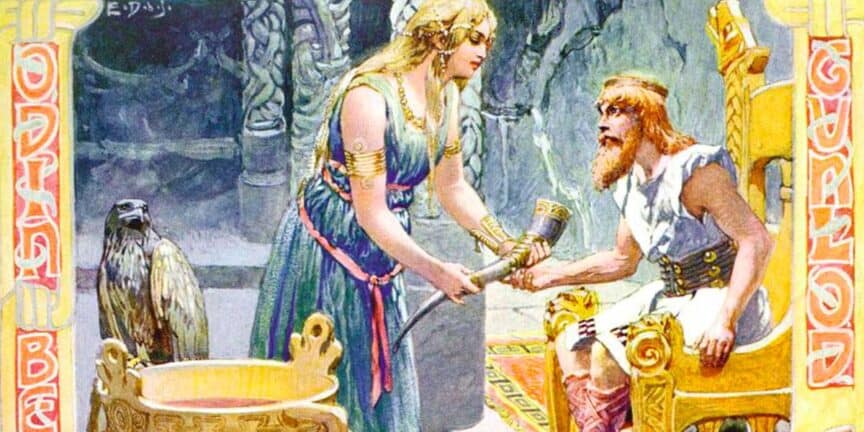Vikings had a social hierarchy most similar to clans that walked the earth during similar times. There were chieftains that decided whether they would go to war with rival clans or join forces to storm and raid a larger common enemy for plunder. It turnss out its hard to gain control for power over other Viking folks but even harder to stay in power once your initial heroism symbol of being a Viking wears off. The " Where is Vinland? " article had surmised, "Viking society was a chieftain or clan society. A chieftain society differs from a state in that it has no central government. Instead it is ruled by several, even many chieftains or lords, each of whom has his own domain of influence. In order to maintain his power, a chieftain has to gain followers who will support him in an armed conflict if necessary, who will promote him as a leader and spread his fame, and who will pay him taxes in the form of a share of their crops, game, and other resources. In return the chieftain can be counted onto protect the rights and welfare of his supporters and to take their side in legal and other disputes. In times of famine or other disasters he would share his supplies to ensure their survival. Chieftain societies are competitive and often unstable and this instability may have played a role in the abandonment of Greenland and Vinland."

So we get that the leader is important to a Viking clan even when all of them could be seen as leaders in their own right but what else goes in to being a Viking leader? They go on to say that "A person’s bearing and leadership qualities were also factors in chieftainships, much like in today’s politics. A successful chieftain distinguished himself in warfare and trade; with impressive homes, clothing, jewelry, and worldly possessions to show their success. Chieftains strived to maintain their status of authority by hosting elaborate banquets, in festively decorated halls, serving as much food and drink as possible. Imported foods such as walnuts (which did not grow north of Denmark), oriental spices, and wine were used to impress the guests."

So it turns out that Viking leaders need to be in a league of their own to keep the other in line for as long as they can which might have intimidated the lesser soldier if not for the fact that Vikings also had a kindness about them to show their troops there are good sides to having one as leader. The VIKING POLITICAL INSTITUTIONS article states that, "A chieftain needed to be generous to his men, he needed to be victorious in battles – to “feed carrion to the ravens,” in the poetic vocabulary of the time – and he needed fame and a good reputation. If he was not able to achieve all of this, he could not achieve any of it. It was through winning battles that he gained the riches that allowed him to be generous, and his generosity stimulated poets… to contribute to his fame by composing and reciting poetry. This, in turn, inspired warriors to seek out the famous [chieftain], so that he got more warriors and won battles even more easily, which gave him a good reputation and more booty to hand out to warriors."
So in the end, the chieftains were more than just gold hungry slave drivers looking for their next weight in gold haul, they took it upon their selves to create a systematic way for their own kind to live and make sense of living outside the establish norms of society while keeping common themes. They kept education, leadership and learning to fight all steadily paced while giving women their due course as well as their right to make decisions even if it superseded a mans. They made this system through hardship benefiting from the hard work they passed down from one leader to the next.
Works Cited
1. Society. Where is Vinland? (n.d.). Retrieved July 20, 2022, from https://www.canadianmysteries.ca/sites/vinland/vikinglife/society/indexen.html
2. Dan. (2019, February 8).
Viking political institutions. Norse Mythology for Smart People. Retrieved July 20, 2022, from https://norse-mythology.org/viking-political-institutions/
-
-
-







Leave a comment
This site is protected by hCaptcha and the hCaptcha Privacy Policy and Terms of Service apply.